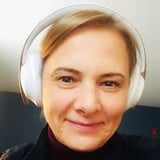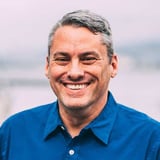Log in or create a free Rosenverse account to watch this video.
Log in Create free account100s of community videos are available to free members. Conference talks are generally available to Gold members.
Summary
Marjorie Stainback I’m planning to talk about how COVID-19 shifted how we conduct research as well as our onboarding experience. We were used to using our in-house lab to speak to in-person participants and while we had the capabilities to go fully remote, we hadn’t built a process around it prior to the pandemic. Once we had that settled, we started hiring which led to an update of our onboarding process. Molly Fargotstein-Sanders Taking a step back at the start of the COVID-19 outbreak, research leadership came together and decided to halt recruitment until we understood the landscape a bit better. Ops took that time to rethink the way we structure our recruitment communications (language, compensation, flexibility) & we worked with researchers to be more flexible with cancellations, no shows, and unwillingness to participate due to the climate (how to navigate deadlines and roadmap expectations). Because of the types of users and customers we have, we took this opportunity to really listen to them & meet them where they are. It really allowed for Ops to take a step back and understand that we can function as the "bleeding heart" of research when the opportunity arises. Stephanie Marsh The quickest decision to be made and supported by the whole organization was not to invite or to do research with scientists and health care professionals that we knew would be working directly on COVID-19. Which meant supporting the pivoting of research to understand new needs both temporary and potentially permanent to our users - Scientists and students. The Research Operations team then worked on recruitment messaging to reassure potential participants that we can be flexible. We have supported and enabled researchers to share lessons learned more widely, such as avoiding afternoon sessions in India because of heavy internet traffic and poor connections. The pandemic prompted us to do emergency planning and identify critical tasks - if all ReOps people weren’t available what would still need to happen, what to do if all research tools were broken etc. We’ve included metrics to track participants' cancellation to quantify impact if any, to understand if perception and reality are the same or different. Longer term we are enabling the wider team to proactively shape the new normal of remote and office working.
Key Insights
-
•
COVID-19 forced immediate 'sink or swim' shifts from in-person to fully remote research operations.
-
•
Updating moderator scripts to acknowledge participant challenges during the pandemic fostered empathy and connection.
-
•
Introducing electronic NDAs accelerated processes that were previously backlogged and overdue for modernization.
-
•
Remote testing expanded participant diversity beyond local geographic limits.
-
•
Building virtual social channels and committees helped sustain team morale and connectedness remotely.
-
•
Prioritizing a few research operations pillars each quarter prevented burnout and maximized impact.
-
•
Self-service recruitment ecosystems empower researchers while easing operational overhead.
-
•
Tracking metrics like participant cancellations offered data-driven validation to continue research despite challenges.
-
•
Remote work leveled international team engagement, making collaboration more equitable.
-
•
Proactively planning for emergencies and adopting flexible, iterative approaches ensured research continuity.
Notable Quotes
"Covid was kind of the mean person who just shoved you into the pool — you had to swim or sink."
"It’s okay to pulse — sometimes you have to take a step back during high market volatility."
"We made sure participants felt safe by adding password protection to Zoom invites to prevent Zoom bombing."
"When everyone is remote, it creates a much more level playing field for international teams."
"We continually iterated on our recruitment scripts, doing up to 15 versions to get it just right."
"Self-service recruitment lets researchers own their participant quality and engagement."
"Team health is vital — if your team isn’t healthy, work won't be successful."
"If one person is remote, then everyone should be remote — virtual first drives equity."
"We ran a 'new normal' workshop to proactively define how we want to work going forward."
"You don't need to do everything yourself — get researchers involved in operational solutions to scale impact."
Or choose a question:














More Videos

"Denying the body is not an antidote to the suffering of the world. When we protect our rest, we protect our dreaming."
Zariah CameronReDesigning Wellbeing for Equitable Care in the Workplace
September 23, 2024

"Priorities aren’t priorities until they’ve been prioritized with attributes and values."
John Cutler Harry MaxPrioritization for designers and product managers (1st of 3 seminars) (Videoconference)
June 13, 2024

"Sharing with context can really help others to make those connections as well."
Nick CochranGrowing in Enterprise Design through Making Connections
June 3, 2019

"Managing change well is about the experience and buy-in of your team, not just frequency of change."
Deanna SmithLeading Change with Confidence: Strategies for Optimizing Your Process
September 23, 2024

"We started the Digital Service as a subsidiary company of the government, not just a government unit."
Magdalena ZadaraZero Hour: How to Get Far Quickly When Starting Your Digital Service Unit Late
November 16, 2022

"If you’re going to be in this room, you have to collaborate and you have to participate."
Nova Wehman-BrownWe've Never Done This Before
June 4, 2019

"We need to learn the domain, the technology, the algorithm, and the data—not enough to code, but enough for meaningful discussions."
Liwei DaiThe Heart and Brain of the AI Research
March 31, 2020

"Flexibility is the network’s ability to reconfigure itself, scalability is ability to expand or shrink, survivability is withstand attacks because codes exist across nodes."
Gordon Ross12 Months of COVID-19 Design and Digital Response with the British Columbia Government
December 8, 2021

"Ruthless prioritization tells us to be more efficient, but it feeds into a punishment culture."
Tutti TaygerlyMake Space to Lead
June 12, 2021


















